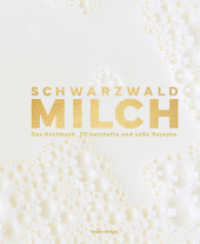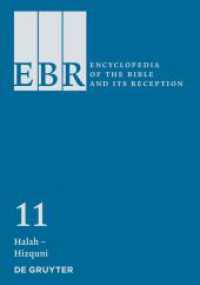- ホーム
- > 洋書
- > 英文書
- > Religion / Ethics
Full Description
Examining Muslim neo-traditionalist scholars in the West and their community of young seekers of sacred knowledge, Walaa Quisay explores the emerging trend within Anglo-American Islam that emphasises the importance of 'tradition'. This book focuses on spiritual retreats hosted by three main shaykhs Hamza Yusuf, Abdal Hakim Murad and Umar Faruq Abd-Allah to examine how religious authority is formed and affirmed.
Through interviews with seekers who have attended retreats, the author sheds light on how discourses are shaped and practised and analyses how neo-traditionalist shaykhs construct the notion of 'tradition' concerning what they perceive to have been lost in modernity. The book highlights the importance of neo-traditionalism in the changing conceptions of religious orthodoxy, religious authority and spirituality for young Muslims in the West, and Quisay examines the political implications to the shaykhs' critiques of modernity as it pertains to political quietism, race and gender.
Contents
Acknowledgments
Foreword by Professor Hasan al-Shafi'i
Introduction
STORIES OF DISENCHANTMENT
1 Locating the (Neo-)Traditional
2 Modern Times
PLACES OF RE-ENCHANTMENT
3 Travelers to Tradition
4 Formation of Authority and Conditions of Plausibility
5 The Metaphysical Lens
6 Race, Gender, and Belonging
LOCATING NEO-TRADITIONALISM IN MODERNITY
7 The Sufi, the Palace, and the People
8 The Seekers, Politics, and Power
Conclusion
Notes
Bibliography
Index








